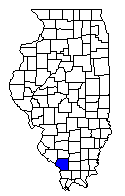
WILLIAM P. SLACK. Valiantly aiding in the defense of his country and its
flag in war and contributing directly and materially, according to his
opportunities and resources, to its industrial and mercantile greatness and
power in peace, William P. Slack, of Carbondale, has proven himself a useful
man in everything he has put his hand to, and a citizen altogether worthy of
the high esteem in which he is held wherever he is known.
His life
began at New Hope, Bucks county, in that great hive of industry,
Pennsylvania, where almost every form of human endeavor finds fruitful
expression and adds to the wealth of the country. He lived in his native
county from his birth on January 12, 1844, until he reached the age of ten
years, and began his scholastic education in the schools of Philadelphia,
which were easily accessible from his home. In 1854 his parents, Henry and
Rachel (Kitchin) Slack, decided to leave their Eastern home and establish a
new one in the West, where everything was new and opportunities for
advancement were eagerly bidding for takers of the right caliber.
Accordingly, in that year they moved their family to Freeport, Illinois,
where for a time the father continued the mercantile enterprise he had
previously conducted in Pennsylvania. From Freeport the family moved to Pana
in Christian county, and afterward to Cairo. He engaged in merchandising in
all these cities, and his son attended school in them in turn until the
beginning of the Civil war. When that momentous conflict opened he was fired
with patriotic zeal for the salvation of the Union, and determined to join
the forces mustering for its defense.
On August 26, 1861, when he
was but little more than seventeen and a half years of age, he and his
brother Charles enlisted in Company G, Fifth Illinois Cavalry. The regiment
was soon on the march for St. Louis, Missouri, and while it was in that
state saw active service in a number of skirmishes. From St. Louis the
command proceeded to Pilot Knob, and from there to Helena, Arkansas, making
its way sometimes without opposition, and sometimes being compelled to wrest
the right to advance from obstinate opponents in arms who made determined
resistance.
The army division to which the Illinois troops were
assigned at length reached the scene of intense hostilities and took part in
the battle of Sligo in the vicinity of Vicksburg. William Slack was the
bugler of his regiment, and the stirring calls he put forth from his bugle
always gave the troops fervor for a fight and animated them for the charge.
His term of enlistment expired in September, 1863, and on the sixteenth day
of that month he was released from the service.
From the excitement
of the battlefield, the ardor of the march, the ennui of the camp, and all
the other exacting conditions of war, he returned to Cairo and became a
clerk in a clothing store, with which he was connected in that capacity
until 1869. He then opened a store of his own, which he conducted until
1882, when he sold it and moved to Carbondale. Here he again engaged in
merchandising in the clothing trade, and continued his operations in that
line of endeavor until June 3, 1898. On that date he was appointed
postmaster, and he has filled the office ever since, having been reappointed
three times.
Mr. Slack was united in marriage with Miss Orpha Crabb,
a native of Indiana and a popular school teacher in Southern Illinois. They
had three children, all of whom are living: Emma, who is the wife of Frank
Rendleman, a wholesale fruit merchant in Chicago; Harry L.; and Mary, the
wife of Lee Haldeman, a prosperous plumber in Anna, Illinois. Their mother
died, and the father contracted a second marriage, uniting himself with Miss
Louie Olmstead, of Anna, Union county, in this state. His political faith
and allegiance are given without stint or reservation to the Republican
party, and he is one of the most ardent and effective workers in the county
for its success in all campaigns. Fraternally he is a Freemason of the Royal
Arch degree and with the rank of past master in his lodge. He also belongs
to the Grand Army of the Republic and holds his membership in John W.
Lawrence Post, No. 297, at Carbondale.
Extracted 15 Jan 2018 by Norma Hass from 1912 A History of Southern Illinois, volume 2, pages 753-754.
Randolph |
Perry | Franklin |
Perry MO |
 |
Williamson |
| Union |


